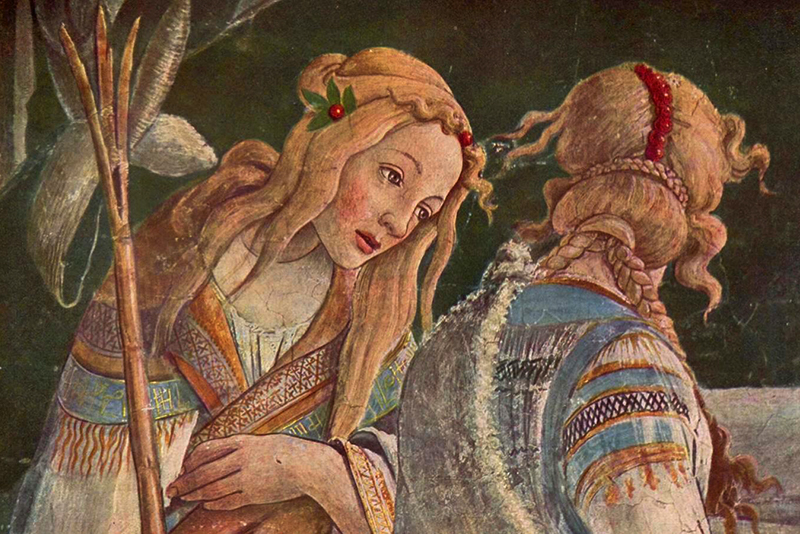
There are many cryptic expressions in the Bible, the meaning of which still isn’t completely clear. Such passages are called crux interpretum (literally interpreter’s cross). One of these most mysterious passages from Exodus is 4: 24-26: “Now at a lodging place along the way, the Lord met Moses and was about to kill him. But Zipporah took a flint knife, cut off her son’s foreskin, and touched it to Moses’ feet “Surely you are a bridegroom of blood to me,” she said. And the Lord departed from him. Then she said, “The bridegroom of blood is by circumcision.” What do these words mean and what is the meaning of Zipphorah’s act? How have rabbis, Christians, and modern scholars interpreted this passage?
Jewish commentators
There are several ancient hermeneuts explaining the act of Zipporah. Neophyte’s Targum (Aramaic exposition of the Bible) puts in the mouth of Zipporah the words that Moses did not circumcise his son, because Jethro, Moses’ father-in-law, opposed him. This interpretation is followed by some Jewish exegetes. The question remains: why did Moses resist such a clear command of God and did not circumcise his son? The ancient interpreters made the assumption that Jethro or Zipporah herself did not allow the eldest son of Moses Girsam to be circumcised, because in their tribe, circumcision was performed only in the 13th year of life. Zipporah, having circumcised her son, corrected the mistake and saved her husband, whose life was in danger due to non-observance of the commandment. (Macho 1970: 24-25). This is a unique case in the entire Bible when a woman performed the circumcision.
There is also another explanation. Moses’ youngest son Eliezer was born eight days before the Lord’s command to Moses to go to Egypt. Moses hastened to fulfill this command and therefore did not have time to circumcise his son. He did not do it at the first lodging place either, first taking up the sleeping accommodation. This episode in the eyes of Jewish interpreters emphasizes the importance of the commandment of circumcision, since even the great Moses himself almost lost his life because of his delay in fulfilling it. However, the strange words of Zipporah remain unclear.
Early Christian elucidators
The Church Fathers had before them a slightly different text than the Jewish theologians, namely the text of the Septuagint, which says that Moses was not threatened by God, but by an angel. They agree that Moses was in danger due to the delay in circumcision, but for Christians this rite lost its meaning, so the fathers were able to focus their interpretations on other facets of the passage. Also, the Fathers directly admitted the mistake made by Moses, while the rabbis are trying in every possible way to justify him. St Hippolytus of Rome claimed that Moses was attacked by the Archangel Michael himself, the guardian angel of the Jewish people. The reason was the fact that it was unacceptable for the legislator to break the Law himself and be declared a false prophet (Commentary on the book of Daniel 4.40.4-5). Origen suggested an elegant version. He said that the angel wasn’t at all from the Lord, but that it was a demon. That demon could harm a Jew only until the circumcision was performed and became completely powerless afterwards. The circumcision that Jesus underwent finally destroyed that angel of darkness, so the Christians now need not be circumcised (Against Celsus, 5:48).
Some fathers departed from the literal understanding of this text all around, explaining everything through allegory. St. Gregory of Nyssa, for instance, saw in Zipporah a pagan philosophy that could be used by Christians on condition of spiritual circumcision, i.e. discarding all unacceptable ideas (Life of Moses, 2.38-41).
Modern understanding
According to recent studies, the passage is about the eldest son of Moses, Gersham, who, like Moses himself, was either not circumcised at all, or partially circumcised, according to the Egyptian custom. Moses was unable to undergo circumcision due to the forthcoming journey that would prevent the wound from healing. Then Zipporah performs a “symbolic” circumcision of Moses, anointing his loins (“legs” in the Bible text is used as a euphemism) with the blood of Gersham. The meaning of her words ceased to be intelligible already in biblical times. Only the historical reconstruction of the Midian tribe’s customs shed light on this “dark” place in the Bible. The expression “bridegroom of the blood” referred to the marriage rituals, when the circumcision of a young man preceded marriage. Zipporah simply uttered the words that were customary to pronounce during this ritual.
There is also a version claiming that Moses was guilty of the blood of an Egyptian, whom he killed while protecting his fellow tribesman. Since only blood could the price for the shed blood, an angel of the Lord appeared to punish Moses, but Zipporah, realizing that Moses was the blood-guilty “bridegroom”, circumcised her son and, anointing Moses, performed the initiation rite on him, as if offering a substitutionary sacrifice for him, thereby cleansing him of blood (Propp 1993).
That is the meaning of this passage. We see that some biblical texts can be understood only by knowing the historical background, culture and customs of the peoples described in the Bible. Knowledge of the text itself may not be sufficient to understand it correctly. That is why it is so important when studying the Bible to also know the geography, history and culture of the Middle Eastern peoples.




